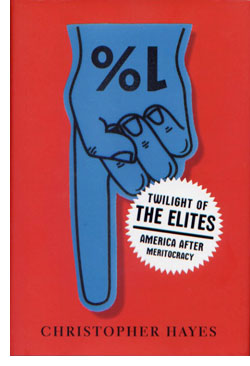 |
 |
 Christopher Hayes
Christopher Hayes
Twilight of the Elites: America After Meritocracy
Crown Books / Random House
US Hardcover First Edition
ISBN 978-0-307-72045-0
Publication Date: 06-12-2012
296 Pages; $26
Date Reviewed: 07-14-2012
Reviewed by: Rick Kleffel © 2012
Index:
Non-Fiction
"America feels broken," Christopher Hayes, Editor at Large for The Nation and host of MSNBC's Up w/Chris Hayes, tells us, as the opening of 'Twilight of the Elites: America After Meritocracy.' That's what we all know, and it's a good gambit to bring us in as readers, no matter what our political beliefs. It's a statement that feels right. The follow-up — to explain why, how it happened and what, if anything, we can do about it, and keep us reading, is much more difficult. Hayes is up to the task. In crisp, often personal prose, with carefully constructed arguments, good stories and a brisk sense of pacing, 'Twilight of the Elites' gets to the heart of what's wrong with a unique vision that combines cultural, historical, political and sociological analysis. In the process, Hayes sort of puts an arrow into the heart of the American Dream.
In 'Twilight of the Elites,' Hayes looks at a belief that is core to our understanding of how we are supposed to live in America, how that understanding misses the mark of what happens in the real world, and the serious consequences of the gap between belief and reality. He's smart, entertaining, and refreshingly agenda-free. While this is a book of social criticism, it does not criticize so much as clarify and analyze meritocracy, which on the face of it sounds like a pretty good idea; and Hayes concedes this — to a degree. What follows is fascinating and more than a little bit scary.
The basic idea behind a meritocracy is that you are appropriately rewarded for the combination of your talents and your efforts. Meritocracies like to test early and often, slot those who score well into advanced programs, and let them rise to the top. The idea is that we get those best suited for the job running the corporations and the country. That is indeed the system we're supposed to have in place in America, but it's not working out so well. Hayes undertakes a keen and intelligent analysis of the stories we've all seen in what he cleverly calls "the fail decade," and successfully sifts through them to find out the weaknesses hidden in the meritocratic system and suggest some remedies.
The first remedy is to question the infallibility of the meritocratic system. Hayes goes straight to his own experience at Hunter College High School. Hunter started out with simple idea; give students a test, and if they score high, admit them, and give them intensive training that will get them into the best colleges. The entry test was the proverbial "level playing field," until a cottage industry of test prep gave those who could afford the prep a means to game the system. It's a microcosm for what happens in all meritocracies.
But Hayes in no reductionist, and he examines a number of notable meritocratic failures with nuance and briskly paced prose writing skill. If you're looking for a heavy hand, look elsewhere; 'Twilight of the Elites' is an entertainingly nuanced vision. And while Hayes rummages through the rolodex of recent disasters with an alarming thoroughness, he also finds reasons for hope now and again. It's a very tricky business to give a refreshingly clear explanation as to why we feel as if the apocalypse has come to pass while we were not looking and then explain why this does not have to be the case without undermining what you've already established as a baseline. But 'Twilight of the Elites' manages the neat trick of showing us the dusk while reminding us that with luck and pluck we can live to see the dawn.
|
 |
|
|
 |
| |
Review Archive
All Reviews alphabetized by author.
General Fiction
Non-Genre, general fiction and literature.
Horror
Supernatural fiction, supernatural horror and non-supernatural horror.
Science Fiction
Science fiction, science fantasy, speculative fiction, alternate history.
Fantasy
Fantasy, surrealism and magic realism.
Mystery
Crime, thrillers, mystery, suspense.
Non-Fiction
Non-Fiction, True Crime, Forteana, Reference.
Poetry
|
|
 |
|




